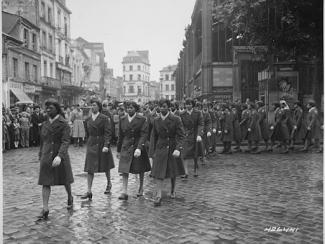
The energy throughout European cities was frenetic. The Allied forces inched closer to ending the war. But outside city walls, in the wet, filthy trenches where soldiers had been for months, their spirits sagged at a lack of contact from home. But hope was on its way.
Leaving the cold streets of New York in February 1945, a battalion 824 strong, of almost entirely Black women, set sail for Britain. Their mission: to sort and distribute a six-month-long backlog of 65,000 pieces of mail due to troops across Europe.
Though their journey was marred almost instantly by German U-boats, they arrived at port on March 4, where they were organized and assigned to get to work. Led by Major Charity Adams Early, the battalion set out to do what no one else could.
The six triple eight worked in deplorable conditions for months. Even still, these Black women were determined to be a driving force for change, bolstering soldier morale. What should have taken half a year took them only three months to complete.
Despite hostilities from Black and white male soldiers, rat-infested conditions, the loss of a few good women, and a slashed workforce after the war ended, the six triple eight served with distinction. They did what we’ve always done; got to work and took care of business.